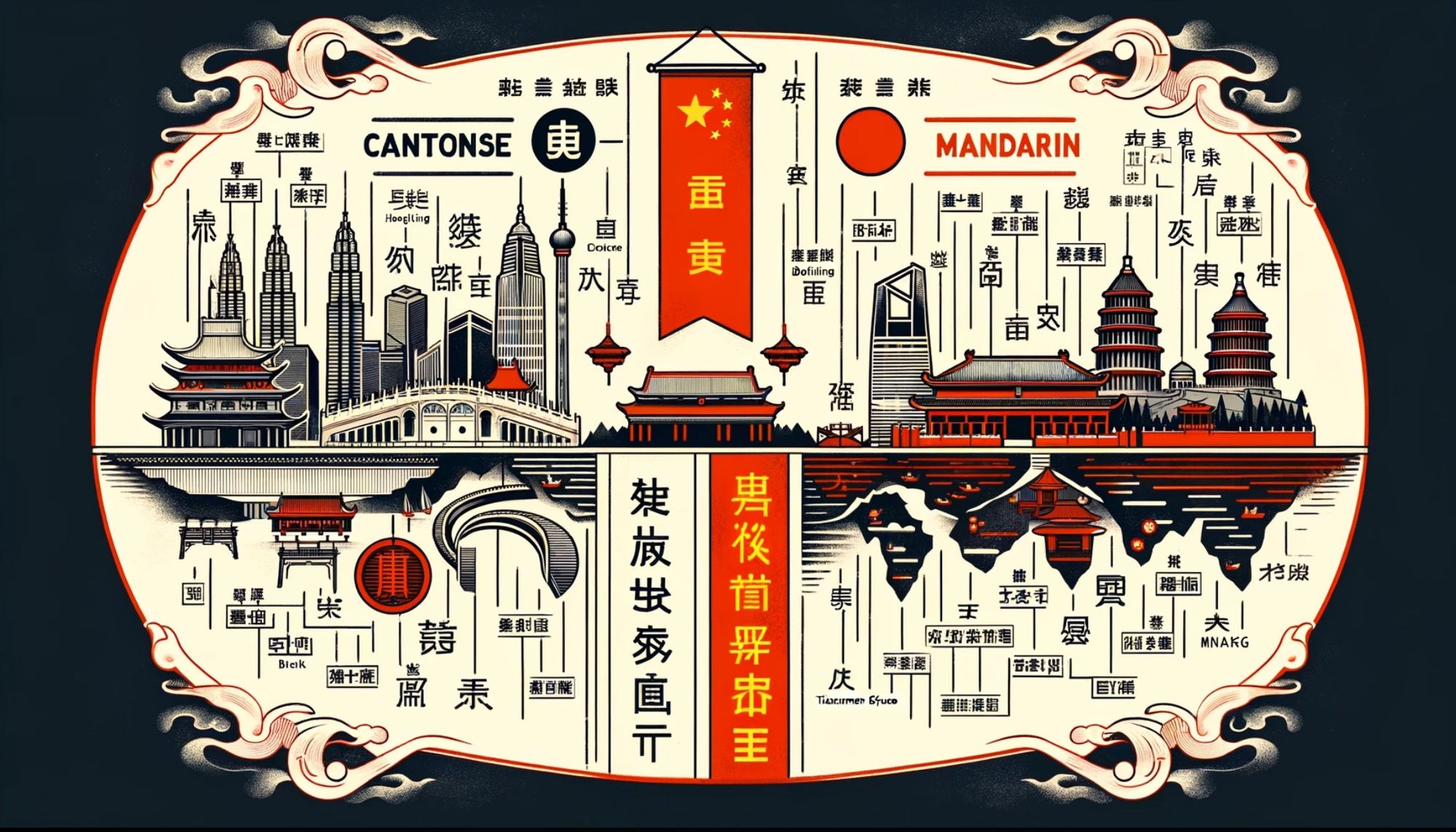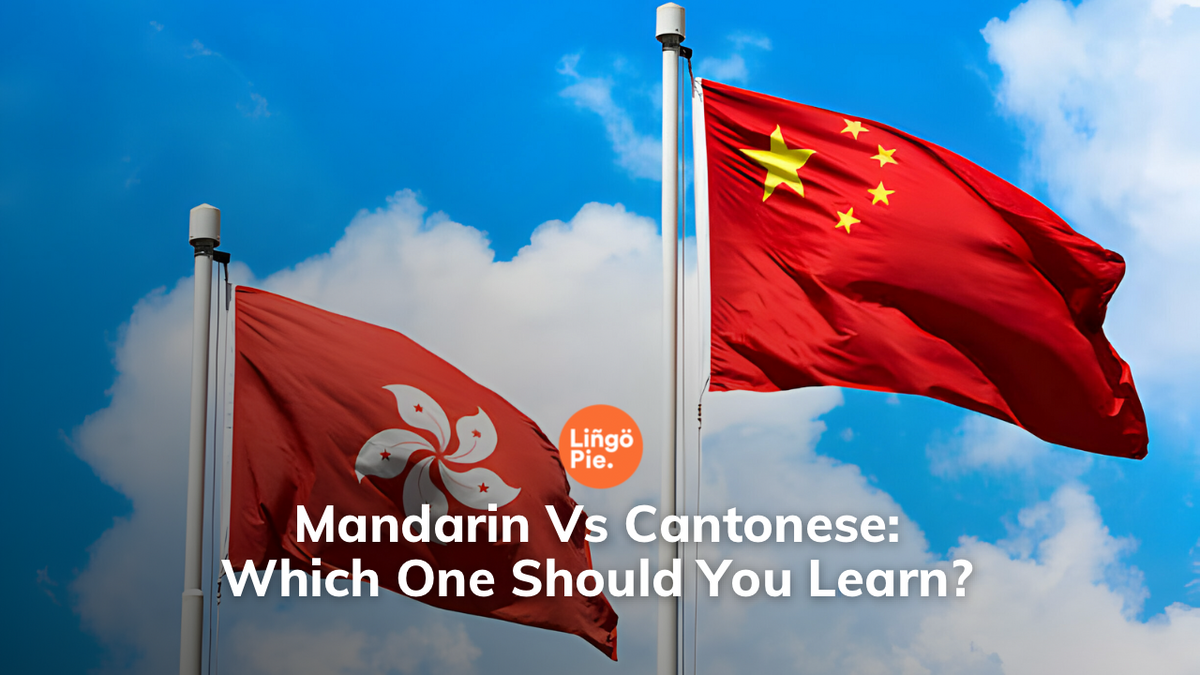To most people, choosing to learn the Chinese language means deciding to study Mandarin. But for others, Cantonese is a more relevant alternative.
As two prominent pillars of the Chinese linguistic landscape, each of these languages boasts its unique history, characteristics, regional significance, and cultural nuances.
In this post, we dissect Mandarin and Cantonese individually, delving into their linguistic intricacies, historical contexts, and contemporary relevance.
In other words, you’re about to learn the differences between the two. We’ll also show you which is likely to be the best choice for your language learning endeavours.

Understanding Mandarin: The Official Language of Mainland China
Mandarin, also known as Standard Chinese, stands as the official language of mainland China.
Boasting the highest number of native speakers, Mandarin is spoken by more than a billion people.
The adoption of simplified Chinese characters and the use of pinyin, a romanization system, contribute to Mandarin's accessibility for learners.
Its prevalence in education, business, and government makes learning Mandarin an advantageous choice for those with practical and career-oriented aspirations.
Beyond its widespread usage, here's a fun fact about Mandarin Chinese: Mandarin is tonal, meaning that the same syllable can carry different meanings based on the tone used.
So, mastering the four (or five) tones in Mandarin adds not just precision but a musical quality to your language skills, making your journey to speak Mandarin both intriguing and harmonious!
Read Also:


Native Mandarin Speakers and Regional Influence
As established, native Mandarin speakers form the majority in mainland China, contributing to the language's dominance.
But China is not the only country in which Mandarin is spoken; the influence of Mandarin extends beyond China's borders, with significant Chinese diaspora communities resttled worldwide.
So, learning Mandarin is useful not only for those seeking linguistic connections in China, but also on a global scale.
Exploring Cantonese in Guangdong and Hong Kong

In contrast to Mandarin's widespread use, Cantonese holds sway in specific regions, notably Hong Kong and parts of Guangdong province.
Traditional Chinese characters and a unique set of linguistic features distinguish Cantonese. It embodies the rich cultural heritage of southern China, and its historical connection to Hong Kong has elevated it to the status of a cultural icon.
Learning Cantonese opens a door to the vibrant traditions and distinct identity of this region. Cantonese is renowned for its rich collection of expressive slang and colloquialisms.
Mastery of Cantonese not only opens doors to traditional culture but also unveils the fascinating world of vibrant and imaginative idioms.
Native Cantonese Speakers and Cultural Significance
Native Cantonese speakers, while fewer in number compared to Mandarin speakers, maintain a strong cultural identity.
Hong Kong's status as a global financial hub ensures that Cantonese remains relevant in international business and trade.
For learners interested in connecting with the cultural nuances of southern China or engaging with communities in Hong Kong, mastering Cantonese provides a valuable gateway.
Mandarin Vs Cantonese - Which is Easier?
Knowing which of the Chinese languages to learn often leads to the question of ease when choosing between Mandarin and Cantonese.
Mandarin is referred to as ‘simplified Chinese’ given its simplified characters and pinyin system. This makes it much easier to learn than Cantonese for most poeple.
That said, both Mandarin and Cantonese present unique challenges. But with a focus on Mandarin, learners can tap into the wealth of resources available, including a wider range of online materials available.
Mandarin vs Cantonese: A Comparative Analysis

This analysis should help you to decide which of these languages to start learning first. As you can see, both Cantonese and Mandarin will be useful. So, let's dive into the details.
1. Mutual Intelligibility and Linguistic Distinctions
Mandarin and Cantonese share a common Chinese linguistic root but exhibit notable differences in pronunciation, vocabulary, and grammar.
While some vocabulary is mutually intelligible, the distinct tonal systems pose a challenge to many language learners. Knowing one language absolutely does not mean that you will understand the other.
In fact, in spoken form Cantonese and Mandarin are extremely different. Mandarin’s four tones (plus an additional neutral tone) contrast with Cantonese's six tones.
However, a shared foundation in Chinese characters facilitates some level of cross-comprehension in written form.
2. Written Language: Simplified vs Traditional Characters
One fundamental difference lies in the characters used for written communication.
Mandarin predominantly employs simplified Chinese characters, a reform aimed at increasing literacy across the country during the China’s Cultural Revolution.
Cantonese, on the other hand, often adheres to traditional characters. Learners must consider this distinction, recognizing its impact on written communication and the historical context it represents.
3. Regional Relevance and Practical Considerations
The choice between Mandarin and Cantonese often hinges on regional preferences and practical considerations.
Mandarin's status as the official language of China and its prevalence in global business make it a pragmatic choice for those seeking broad applications.
Cantonese, with its stronghold in specific regions, proves advantageous for individuals with a keen interest in the cultural dynamics of Hong Kong or southern China.
4. Tonal Complexity
This point has been mentioned already when discussing mutual inteligibility, but the tonal complexity of these languages cannot be understated.
Mandarin's four tones and neutral tone contribute to its rhythmic and musical quality, resembling a linguistic melody.
On the other hand, Cantonese boasts six distinct tones, offering a rich tonal palette that adds depth and nuance to spoken expressions.
5. Cultural Exploration
Beyond practical considerations, both Mandarin and Cantonese serve as gateways to China's rich culture and history.
Mandarin provides access to the cultural heart of mainland China, with its historical significance and influence.
Cantonese, on the other hand, is rooted in the vibrant traditions of Hong Kong and southern China.
When deciding whether you want to learn Mandarin or Cantonese, consider your cultural interests and aspirations, as both languages offer distinct journeys into China's multifaceted heritage.
Mandarin and Cantonese - Where to Learn Them
For those interested in learning Mandarin and Cantonese, numerous avenues offer a gateway to proficiency.
Online platforms like Lingopie provide a casual way to learn Mandarin through TV shows and movies, but there are other free resources online provide structured courses and supplementary study materials.
Generally, there is no better way to learn a language than by immersing yourself in that specific country. And traveling to China presents an immersive opportunity, with Mandarin predominant in mainland regions and Cantonese flourishing in places like Hong Kong.
Additionally, popular YouTube channels, such as those led by enthusiastic language educators, offer free and accessible lessons, making language learning a digital and interactive experience.
Whether through virtual classrooms or real-world exploration, resources abound for those eager to delve into the spoken intricacies of Mandarin and Cantonese.
Summing up: Mandarin Vs Cantonese
Both Mandarin and Cantonese possess a unique charm and relevance both socially and professionally.
For practicality and global communication, Mandarin emerges as the frontrunner, boasting widespread use and official status.
However, Cantonese carves its niche, offering cultural richness and regional significance. The choice ultimately rests on individual goals, be it navigating the international business arena with Mandarin or immersing in the vibrant traditions of southern China with Cantonese.
Sign up today for a free trial with Lingopie and start your journey towards fluency in Mandarin Chinese.
FAQs
You should now know more about the differences between Mandarin and Cantonese, as well as China’s dialects in general. In this section, we answer common questions relating to this topic.
Can a Mandarin speaker understand Cantonese?
While Mandarin and Cantonese share a linguistic root, understanding Cantonese can be challenging for Mandarin speakers due to differences in pronunciation, vocabulary, and tone. Some very basic vocabulary may be mutually intelligible, but the distinct tonal systems often pose difficulties, making it not entirely straightforward for a Mandarin speaker to comprehend Cantonese.
What is better to learn Mandarin or Cantonese?
The choice between Mandarin and Cantonese depends on individual goals and preferences. Mandarin is more widely spoken, making it practical for global communication and career opportunities. Cantonese, with its cultural richness, is advantageous for those interested in specific regions like Hong Kong.
Is Mandarin more useful than Cantonese?
In terms of practicality and usefulness on a global scale, Mandarin holds the edge. As the official language of mainland China and widely spoken worldwide, Mandarin offers broader applications in business, education, and international communication. However, Cantonese may be more useful for individuals with specific cultural or regional interests, such as those engaging with Hong Kong.
How many Chinese languages are there?
China is home to a diverse linguistic landscape with numerous languages and dialects. While Mandarin and Cantonese are prominent, there are several other Chinese languages and dialects spoken across different regions. The exact count varies, but the linguistic richness extends beyond Mandarin and Cantonese, encompassing a range of language variations across China.
How can you tell Cantonese and Mandarin apart?
Distinctive features help differentiate Cantonese and Mandarin. One notable difference lies in their spoken form, with variations in pronunciation, tones, and vocabulary. Additionally, the characters used for written communication differ, with Mandarin primarily using simplified characters and Cantonese often adhering to traditional characters. These variations provide cues for distinguishing between Cantonese and Mandarin in both spoken and written forms.







![Qixi Festival Guide: Meaning, Traditions, and Chinese Love Vocabulary [Guide]](/blog/content/images/size/w300/2025/06/Qixi-Festival-Guide.jpg)


